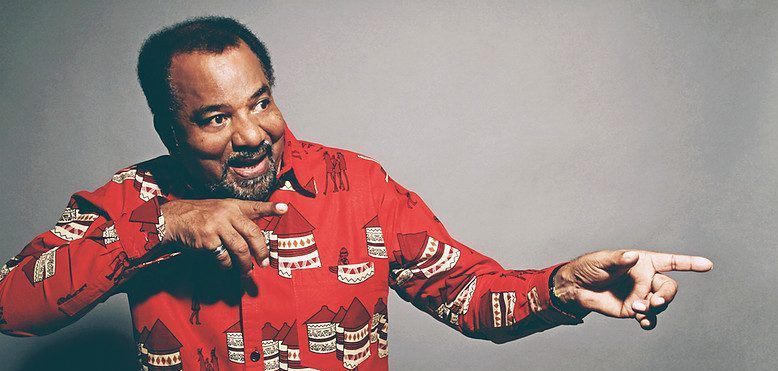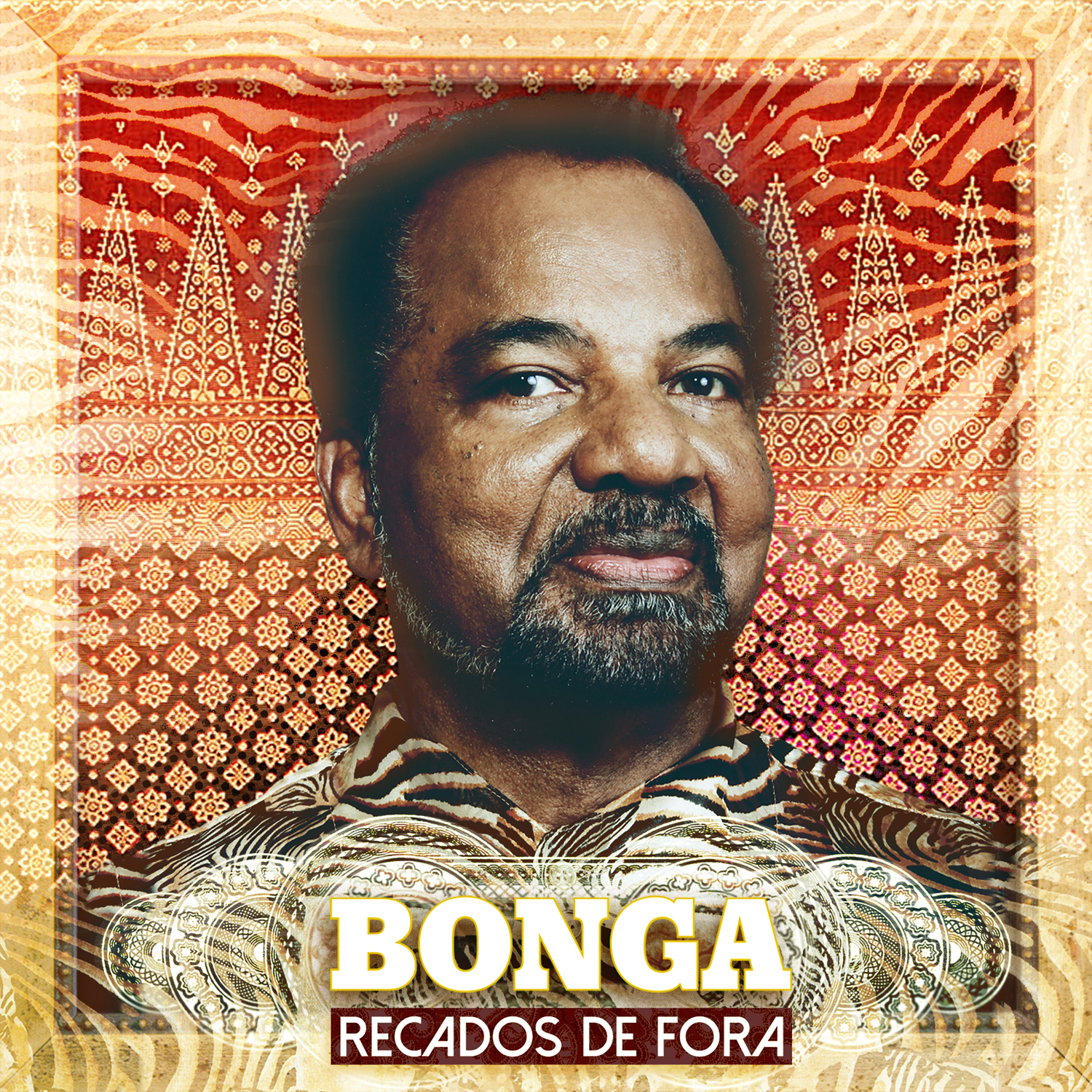
Angolan semba, Cape Verdean morna, Brazilian Nordeste music and Portuguese fado: aged 74, the wiseman Bonga “Kota” performs the rhythms and melodies he’s discovered during his never-ending exile and sends a message of emancipation and fraternity across the Atlantic ocean, against all odds.
Two months only after having celebrated its 74 years with a stunning concert in his hometown Lisbon, Bonga aka “Kota” (the wise man) released a new album, entitled Recados de Fora (“Messages from elsewhere”) and shows that time can be your best partner when it comes to music. The voice, the melodies and the rhythms of the Angolan-born artist only get better with the years, like a stew tastes better the next day.
But sometimes food may taste bitter : “There’s kipico, there’s kibeba / There’s kanjika, there’s kizaka”, sings Bonga in the song “Recados de Fora”, listing four of the national traditional dishes, before admitting “What I ate was enough for me”. It’s a warning “message from abroad” addressed to the Angolan people who’d better be wary of the shenanigans of the wealthy class rather than putting too much food on the table, or criticizing their own poor neighbours: “Don’t scold somebody else’s child / If yours is worse. / Don’t eat from the pot / If you can’t cook”. Is Bonga a marxist singer then? He may not be an ideologist, but he’s always been a true advocate of the class war idea that the oppressed should unite under the same interests. “Sons of Angola / Break out of your lethargy”, he sings in “Anangola”, and goes on with:
Angolans
Get to your feet
And look around you
Sing more about your real world.
Some people run away
Some people weep
Others are in prison
Because they spoke out.
in “Ngo Kuivu” (“I Understood”), here referring to the 17 young members of the Revolutionary Movement for Angola who were jailed for “rebellion against the president of the republic and criminal association”. Their crime? Together they discussed together the book “Tools to Destroy a Dictatorship and Avoiding a New Dictatorship”, whose author promotes non-violent means to change the system. Indeed, 41 years after Angola gained independence, there is still a lot to be done regarding political and social matters, and Bonga’s gravelly voice will not stop denouncing the abuse of power coming from a dictatorship that dare not speak its name.
IT’S A WARNING “MESSAGE FROM ABROAD” ADDRESSED TO THE ANGOLAN PEOPLE WHO’D BETTER BE WARY OF THE SHENANIGANS OF THE WEALTHY CLASS RATHER THAN PUTTING TOO MUCH FOOD ON THE TABLE, OR CRITICIZING THEIR OWN POOR NEIGHBOURS.
“I should tell you / That everyone must be at its right place abroad. / While the privileged are coming here too / The poor will suffer everywhere” he sings in “Marikota”, a semba whose upbeat music contrasts with the violent lyrics, relating a woman’s departure to Lisboa. She tries to flee the misery and violence she’s been enduring in the musseque, the Angolan suburban slums where she lives. Not only does Bonga tries to show support to his fellow countrymen and women who live in his birthland, he also warns them against the dangers of an exile abroad, a dream many Angolan still cherish nowadays. He himself had to put up with exile in 1966 when the Portuguese secret police (PIDE) realized that the young 400 metres champion José Adelino Barcelo de Carvalho who was bearing the Portuguese colours during the international athletics competitions, was the same person as Bonga Kuenda, the Angolan independence activist who helped building a network of revolutionaries abroad during his official travels as an athlete. He was forced to leave Portugal, and has since kept on helping the oppressed people through his emotional voice and the dikanza, a cylindrical body made of bamboo or wood rubbed with a wooden stick, that he plays with virtuosity, an instrument that stood as an anti-colonialist symbol.
Dikanza, ungué, puita, accordion… the instruments of the semba and rebita are everywhere on this record except on the rather surprising rendition of Zé do Norte’s classic tune “Sodade Meu Bem, Sodade” that the Brazilian composer wrote when he was 11! After having been quoted by Caetano Veloso in “It’s a Long Way” (“Transa” LP) and by Maria Bethânia (“Olho d’Água” LP), and then covered by Nana Caymmi (“Renascer” LP), the love song finds a new setting 50 years later, on the other side of the Atlantic with Bonga’s rendition. “Silence! Fado will be sung now!”, as they shout in Lisbon: the Portuguese guitar and the viola first frame the song in the genre popularized by Amália Rodrigues, but when Cesária Évora’s close friend starts to sing, it immediately reminds that morna and fado share the same African roots. No need for a musicologist explanation here: this 4-minute musical argumentation is enough.
PRECISELY, “WORLDWIDE MUSIC” WOULD BEST DESCRIBE BONGA’S WORK, OFFERING AN ALTERNATIVE SOURCE OF INFORMATION FOR ANGOLAN PEOPLE, A PRISM FOR IDENTITY UNDERSTANDING FOR AFRICAN CULTURES SPREAD OVER THE WORLD, AND A BRIDGE OF RECONCILIATION BETWEEN AFRICA AND THE WESTERN WORLD.
The festive feeling is not missing, even though most of the topics are serious considerations about post-colonial life in Angola (“Água Raz” about the miserable life in the musseque; “Espalha” about the opulence shown by the wealth during the popular festivities; “Outros Tempos” about a nostalgic traditional Angola that still can be found despite the modern post-colonial storytelling and reality; “Ngo Kuivu”, “Recados de Fora”, “Anangola” and “Marikota”, already mentioned). Thus, there is still room for party (“Tonokenu”, an ode to the Angolan way for music and dance), and love (“Odji Maguado”, a cover of a morna song penned by Cape Verde’s most talented and prolific composer B.Leza in the ‘50s, and previously recorded by Bonga in 1994 and by Cesária Évora in 1990).
Humanist to the bone, the globetrotter must have met at least as many passionate people as the number of songs he wrote on the 32 albums he has recorded in the course of a 44-year long career. Amongst them was the late Rémy Kolpa Kopoul, a tireless music lover, journalist, radio host, and DJ who died last year. “Banza Remy” (“A thought for Remy”) is Bonga’s tribute to a friend, but also to one of his very first supports and to a pro-active promoter of the African diaspora music from Caribe, West Indies… years before the discriminatory term “world music” was invented.
Precisely, “worldwide music” would best describe Bonga’s work, offering an alternative source of information for Angolan people, an common identity prism for African cultures spread over the world, and a bridge of reconciliation between Africa and the Western world. And the whole thing is wrapped into a beautifully crafted artwork that still promotes emancipation and fraternity across the Atlantic ocean, against all odds.
LISTEN TO THE ALBUM AND FOLLOW OUR PLAYLIST “ALBUM OF THE WEEK” ON SPOTIFY & DEEZER !
Bonga – Recados de Fora, release 4th november 2016 on Lusafrica

Bonga © N’Krumah Lawson Daku 2016




